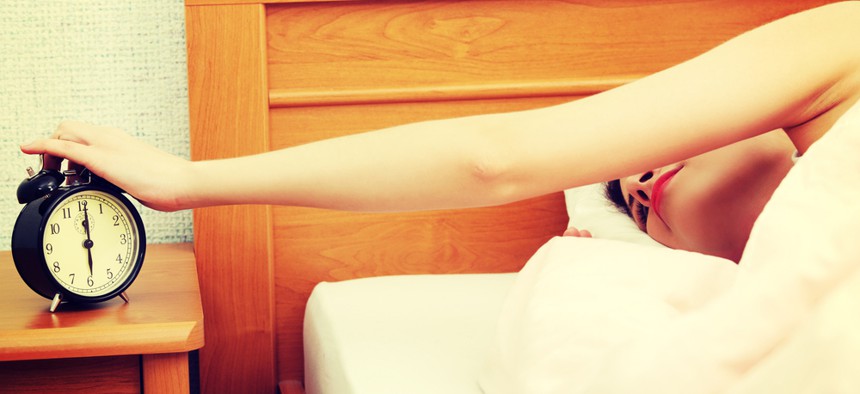
Piotr Marcinski/Shutterstock.com
How Much Sleep Do Americans Trade for Work?
Some Americans forgo a significant amount of sleep in order to make more time for commuting, socializing, and grooming—but most of all, working.
Among my Type A, career-minded friends, I've heard two opposing types of personal mantras for the amount of sleep a person should get. The first: 8 hours of sleep will help you be more awake and aware, and then you can work harder. The second: Sleep is for losers.
The American Time Use Survey(ATUS) reports that employed Americans spend on average one more hour working than they do sleeping on workdays. Worldwide, America lags behind Europe in OECD's work-life balance index—not to mention Americans are more likely to work late at night and on weekends than Europeans. And although the recommended amount of sleep is seven to eight hours a night, the Centers for Disease Control and Prevention reports that 30 percent of employed Americans—or roughly 40 million workers—sleeps six hours or fewer each night.
A new study in the journal Sleep looks at the activities that are most exchanged for slumber. Using data from the ATUS, researchers Mathias Basner, Andrea Spaeth, and David Dinges sorted sleepers into three groups and compared their waking habits: short sleepers (those who sleep fewer than six hours a night), normal sleepers (six to 11 hours), and long sleepers (more than 11 hours).
Number one on their list of sleep-reducing activities? Work.
“The evidence that time spent working was the most prominent sleep thief was overwhelming,” said lead author Mathias Basner, assistant professor at the University of Pennsylvania Perelman School of Medicine, in a press release.
The study found that work was the activity most exchanged for sleep onweekdays, weekends, and holidays across all sociodemographic categories. In particular, they saw that short sleepers worked 1.6 hours more on weekdays and 1.9 hours more on weekends and holidays compared with normal sleepers. They also found self-employed workers sleep more than private sector or government employees. Unsurprisingly, they found that workers with multiple jobs were 61 percent more likely to be short sleepers.
In second place for the culprit of decreasing sleep was length of commute—short sleepers tend to have longer commutes to school or work. Americans average 25 minutes of travel to work, but longer commutes for 1.7 million Americans come in at over 90 minutes.
Other habits that people give up sleep for will sound familiar: socializing and sleeplessness at night, and grooming in the morning. Their study ranked watching TV at number nine on the list of activities that are commonly exchanged for sleep.
There are some shortcomings to this study. As the accompanying commentary notes, this study uses time-use survey data—meaning it doesn't take into account sleep-affecting factors such as alcohol, caffeine, medication, or light exposure.
However, as lack of sleep is linked to health problems (obesity, hypertension, and cognitive performance, to name a few) and even car accidents (the study cites that least 83,000 car crashes in the U.S. are due to drowsy driving)—the researchers recommend shorter commutes and that later start times for school and work might help Americans get more sleep. And if those are not options, the small things that can give big gains to our sleep time are socializing less and getting ready faster in the morning. In other words, sleep a little more and don't worry—your hair looks great.
(Image via Piotr Marcinski/Shutterstock.com)






